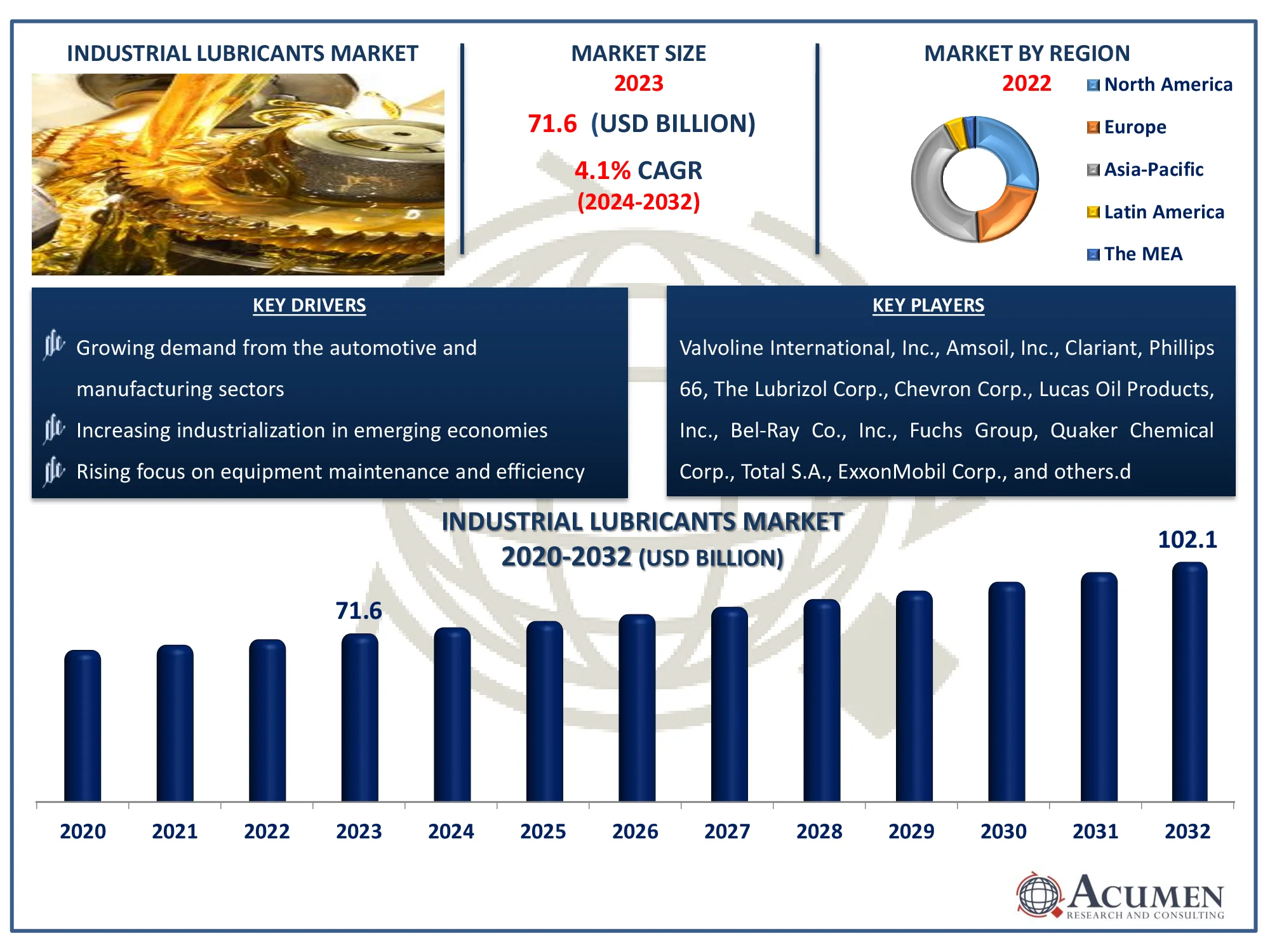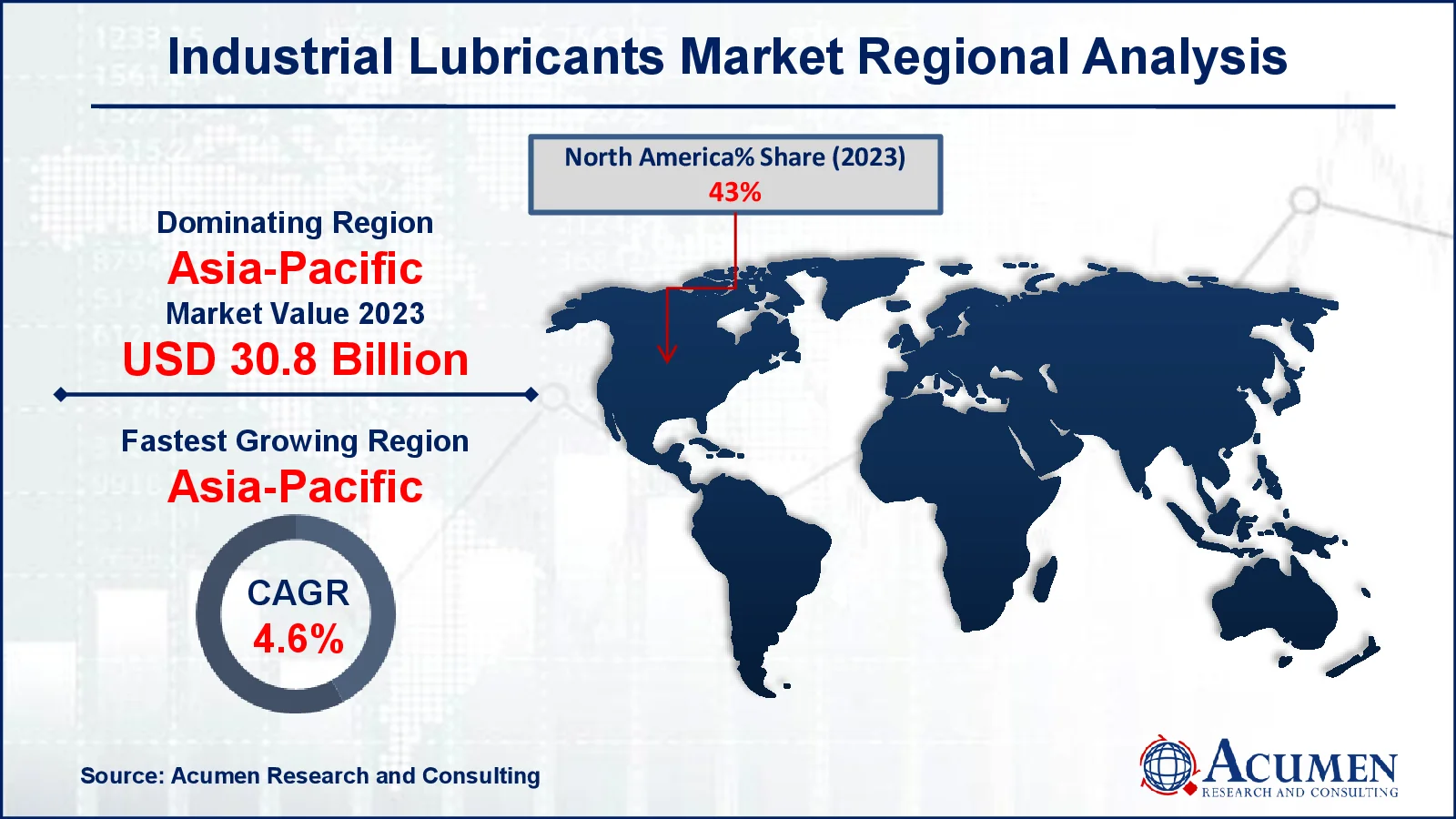
Industrial Lubricants Market Size - Global Industry, Share, Analysis, Trends and Forecast 2024 - 2032
CHAPTER 1. Industry Overview of Industrial Lubricants Market
1.1. Definition and Scope
1.1.1. Definition of Industrial Lubricants
1.1.2. Market Segmentation
1.1.3. Years Considered for the Study
1.1.4. Assumptions and Acronyms Used
1.1.4.1. Market Assumptions and Market Forecast
1.1.4.2. Acronyms Used in Global Industrial Lubricants Market
1.2. Summary
1.2.1. Executive Summary
1.2.2. Industrial Lubricants Market By Product
1.2.3. Industrial Lubricants Market By Base Oil
1.2.4. Industrial Lubricants Market By Application
1.2.5. Industrial Lubricants Market By Region
CHAPTER 2. Research Approach
2.1. Methodology
2.1.1. Research Programs
2.1.2. Market Size Estimation
2.1.3. Market Breakdown and Data Triangulation
2.2. Data Source
2.2.1. Secondary Sources
2.2.2. Primary Sources
CHAPTER 3. Market Dynamics And Competition Analysis
3.1. Market Drivers
3.1.1. Driver 1
3.1.2. Driver 2
3.1.3. Driver 3
3.2. Restraints and Challenges
3.2.1. Restraint 1
3.2.2. Restraint 2
3.2.3. Restraint 3
3.3. Growth Opportunities
3.3.1. Opportunity 1
3.3.2. Opportunity 2
3.3.3. Opportunity 3
3.4. Porter’s Five Forces Analysis
3.4.1. Bargaining Power of Suppliers
3.4.2. Bargaining Power of Buyers
3.4.3. Threat of Substitute
3.4.4. Threat of New Entrants
3.4.5. Degree of Competition
3.5. Market Concentration Ratio and Market Maturity Analysis of Industrial Lubricants Market
3.5.1. Go To Market Strategy
3.5.1.1. Introduction
3.5.1.2. Growth
3.5.1.3. Maturity
3.5.1.4. Saturation
3.5.1.5. Possible Development
3.6. Technological Roadmap for Industrial Lubricants Market
3.7. Value Chain Analysis
3.7.1. List of Key Manufacturers
3.7.2. List of Customers
3.7.3. Level of Integration
3.8. Cost Structure Analysis
3.8.1. Price Trend of Key Raw Materials
3.8.2. Raw Material Suppliers
3.8.3. Proportion of Manufacturing Cost Structure
3.8.3.1. Raw Material
3.8.3.2. Labor Cost
3.8.3.3. Manufacturing Expense
3.9. Regulatory Compliance
3.10. Competitive Landscape, 2023
3.10.1. Player Positioning Analysis
3.10.2. Key Strategies Adopted By Leading Players
CHAPTER 4. Manufacturing Plant Analysis
4.1. Manufacturing Plant Location and Establish Date of Major Manufacturers in 2023
4.2. R&D Status of Major Manufacturers in 2023
CHAPTER 5. Industrial Lubricants Market By Product
5.1. Introduction
5.2. Industrial Lubricants Revenue By Product
5.2.1. Industrial Lubricants Revenue (USD Billion) and Forecast, By Product, 2020-2032
5.2.2. Metal working fluids
5.2.2.1. Metal working fluids Market Revenue (USD Billion) and Growth Rate (%), 2020-2032
5.2.3. Turbine lubricants
5.2.3.1. Turbine lubricants Market Revenue (USD Billion) and Growth Rate (%), 2020-2032
5.2.4. Gear lubricants
5.2.4.1. Gear lubricants Market Revenue (USD Billion) and Growth Rate (%), 2020-2032
5.2.5. Hydraulic lubricants
5.2.5.1. Hydraulic lubricants Market Revenue (USD Billion) and Growth Rate (%), 2020-2032
5.2.6. Compressor lubricants
5.2.6.1. Compressor lubricants Market Revenue (USD Billion) and Growth Rate (%), 2020-2032
CHAPTER 6. Industrial Lubricants Market By Base Oil
6.1. Introduction
6.2. Industrial Lubricants Revenue By Base Oil
6.2.1. Industrial Lubricants Revenue (USD Billion) and Forecast, By Base Oil, 2020-2032
6.2.2. Mineral Oil
6.2.2.1. Mineral Oil Market Revenue (USD Billion) and Growth Rate (%), 2020-2032
6.2.3. Synthetic Oil
6.2.3.1. Synthetic Oil Market Revenue (USD Billion) and Growth Rate (%), 2020-2032
6.2.4. Bio-based Oil
6.2.4.1. Bio-based Oil Market Revenue (USD Billion) and Growth Rate (%), 2020-2032
CHAPTER 7. Industrial Lubricants Market By Application
7.1. Introduction
7.2. Industrial Lubricants Revenue By Application
7.2.1. Industrial Lubricants Revenue (USD Billion) and Forecast, By Application, 2020-2032
7.2.2. Energy
7.2.2.1. Energy Market Revenue (USD Billion) and Growth Rate (%), 2020-2032
7.2.3. Chemical Manufacturing
7.2.3.1. Chemical Manufacturing Market Revenue (USD Billion) and Growth Rate (%), 2020-2032
7.2.4. Metalworking
7.2.4.1. Metalworking Market Revenue (USD Billion) and Growth Rate (%), 2020-2032
7.2.5. Hydraulic
7.2.5.1. Hydraulic Market Revenue (USD Billion) and Growth Rate (%), 2020-2032
7.2.6. Textiles
7.2.6.1. Textiles Market Revenue (USD Billion) and Growth Rate (%), 2020-2032
7.2.7. Food Processing
7.2.7.1. Food Processing Market Revenue (USD Billion) and Growth Rate (%), 2020-2032
CHAPTER 8. North America Industrial Lubricants Market By Country
8.1. North America Industrial Lubricants Market Overview
8.2. U.S.
8.2.1. U.S. Industrial Lubricants Revenue (USD Billion) and Forecast By Product, 2020-2032
8.2.2. U.S. Industrial Lubricants Revenue (USD Billion) and Forecast By Base Oil, 2020-2032
8.2.3. U.S. Industrial Lubricants Revenue (USD Billion) and Forecast By Application, 2020-2032
8.3. Canada
8.3.1. Canada Industrial Lubricants Revenue (USD Billion) and Forecast By Product, 2020-2032
8.3.2. Canada Industrial Lubricants Revenue (USD Billion) and Forecast By Base Oil, 2020-2032
8.3.3. Canada Industrial Lubricants Revenue (USD Billion) and Forecast By Application, 2020-2032
8.4. North America PEST Analysis
CHAPTER 9. Europe Industrial Lubricants Market By Country
9.1. Europe Industrial Lubricants Market Overview
9.2. U.K.
9.2.1. U.K. Industrial Lubricants Revenue (USD Billion) and Forecast By Product, 2020-2032
9.2.2. U.K. Industrial Lubricants Revenue (USD Billion) and Forecast By Base Oil, 2020-2032
9.2.3. U.K. Industrial Lubricants Revenue (USD Billion) and Forecast By Application, 2020-2032
9.3. Germany
9.3.1. Germany Industrial Lubricants Revenue (USD Billion) and Forecast By Product, 2020-2032
9.3.2. Germany Industrial Lubricants Revenue (USD Billion) and Forecast By Base Oil, 2020-2032
9.3.3. Germany Industrial Lubricants Revenue (USD Billion) and Forecast By Application, 2020-2032
9.4. France
9.4.1. France Industrial Lubricants Revenue (USD Billion) and Forecast By Product, 2020-2032
9.4.2. France Industrial Lubricants Revenue (USD Billion) and Forecast By Base Oil, 2020-2032
9.4.3. France Industrial Lubricants Revenue (USD Billion) and Forecast By Application, 2020-2032
9.5. Spain
9.5.1. Spain Industrial Lubricants Revenue (USD Billion) and Forecast By Product, 2020-2032
9.5.2. Spain Industrial Lubricants Revenue (USD Billion) and Forecast By Base Oil, 2020-2032
9.5.3. Spain Industrial Lubricants Revenue (USD Billion) and Forecast By Application, 2020-2032
9.6. Rest of Europe
9.6.1. Rest of Europe Industrial Lubricants Revenue (USD Billion) and Forecast By Product, 2020-2032
9.6.2. Rest of Europe Industrial Lubricants Revenue (USD Billion) and Forecast By Base Oil, 2020-2032
9.6.3. Rest of Europe Industrial Lubricants Revenue (USD Billion) and Forecast By Application, 2020-2032
9.7. Europe PEST Analysis
CHAPTER 10. Asia Pacific Industrial Lubricants Market By Country
10.1. Asia Pacific Industrial Lubricants Market Overview
10.2. China
10.2.1. China Industrial Lubricants Revenue (USD Billion) and Forecast By Product, 2020-2032
10.2.2. China Industrial Lubricants Revenue (USD Billion) and Forecast By Base Oil, 2020-2032
10.2.3. China Industrial Lubricants Revenue (USD Billion) and Forecast By Application, 2020-2032
10.3. Japan
10.3.1. Japan Industrial Lubricants Revenue (USD Billion) and Forecast By Product, 2020-2032
10.3.2. Japan Industrial Lubricants Revenue (USD Billion) and Forecast By Base Oil, 2020-2032
10.3.3. Japan Industrial Lubricants Revenue (USD Billion) and Forecast By Application, 2020-2032
10.4. India
10.4.1. India Industrial Lubricants Revenue (USD Billion) and Forecast By Product, 2020-2032
10.4.2. India Industrial Lubricants Revenue (USD Billion) and Forecast By Base Oil, 2020-2032
10.4.3. India Industrial Lubricants Revenue (USD Billion) and Forecast By Application, 2020-2032
10.5. Australia
10.5.1. Australia Industrial Lubricants Revenue (USD Billion) and Forecast By Product, 2020-2032
10.5.2. Australia Industrial Lubricants Revenue (USD Billion) and Forecast By Base Oil, 2020-2032
10.5.3. Australia Industrial Lubricants Revenue (USD Billion) and Forecast By Application, 2020-2032
10.6. South Korea
10.6.1. South Korea Industrial Lubricants Revenue (USD Billion) and Forecast By Product, 2020-2032
10.6.2. South Korea Industrial Lubricants Revenue (USD Billion) and Forecast By Base Oil, 2020-2032
10.6.3. South Korea Industrial Lubricants Revenue (USD Billion) and Forecast By Application, 2020-2032
10.7. Rest of Asia-Pacific
10.7.1. Rest of Asia-Pacific Industrial Lubricants Revenue (USD Billion) and Forecast By Product, 2020-2032
10.7.2. Rest of Asia-Pacific Industrial Lubricants Revenue (USD Billion) and Forecast By Base Oil, 2020-2032
10.7.3. Rest of Asia-Pacific Industrial Lubricants Revenue (USD Billion) and Forecast By Application, 2020-2032
10.8. Asia Pacific PEST Analysis
CHAPTER 11. Latin America Industrial Lubricants Market By Country
11.1. Latin America Industrial Lubricants Market Overview
11.2. Brazil
11.2.1. Brazil Industrial Lubricants Revenue (USD Billion) and Forecast By Product, 2020-2032
11.2.2. Brazil Industrial Lubricants Revenue (USD Billion) and Forecast By Base Oil, 2020-2032
11.2.3. Brazil Industrial Lubricants Revenue (USD Billion) and Forecast By Application, 2020-2032
11.3. Mexico
11.3.1. Mexico Industrial Lubricants Revenue (USD Billion) and Forecast By Product, 2020-2032
11.3.2. Mexico Industrial Lubricants Revenue (USD Billion) and Forecast By Base Oil, 2020-2032
11.3.3. Mexico Industrial Lubricants Revenue (USD Billion) and Forecast By Application, 2020-2032
11.4. Rest of Latin America
11.4.1. Rest of Latin America Industrial Lubricants Revenue (USD Billion) and Forecast By Product, 2020-2032
11.4.2. Rest of Latin America Industrial Lubricants Revenue (USD Billion) and Forecast By Base Oil, 2020-2032
11.4.3. Rest of Latin America Industrial Lubricants Revenue (USD Billion) and Forecast By Application, 2020-2032
11.5. Latin America PEST Analysis
CHAPTER 12. Middle East & Africa Industrial Lubricants Market By Country
12.1. Middle East & Africa Industrial Lubricants Market Overview
12.2. GCC
12.2.1. GCC Industrial Lubricants Revenue (USD Billion) and Forecast By Product, 2020-2032
12.2.2. GCC Industrial Lubricants Revenue (USD Billion) and Forecast By Base Oil, 2020-2032
12.2.3. GCC Industrial Lubricants Revenue (USD Billion) and Forecast By Application, 2020-2032
12.3. South Africa
12.3.1. South Africa Industrial Lubricants Revenue (USD Billion) and Forecast By Product, 2020-2032
12.3.2. South Africa Industrial Lubricants Revenue (USD Billion) and Forecast By Base Oil, 2020-2032
12.3.3. South Africa Industrial Lubricants Revenue (USD Billion) and Forecast By Application, 2020-2032
12.4. Rest of Middle East & Africa
12.4.1. Rest of Middle East & Africa Industrial Lubricants Revenue (USD Billion) and Forecast By Product, 2020-2032
12.4.2. Rest of Middle East & Africa Industrial Lubricants Revenue (USD Billion) and Forecast By Base Oil, 2020-2032
12.4.3. Rest of Middle East & Africa Industrial Lubricants Revenue (USD Billion) and Forecast By Application, 2020-2032
12.5. Middle East & Africa PEST Analysis
CHAPTER 13. Player Analysis Of Industrial Lubricants Market
13.1. Industrial Lubricants Market Company Share Analysis
13.2. Competition Matrix
13.2.1. Competitive Benchmarking of key players by price, presence, market share, and R&D investment
13.2.2. New Product Launches and New Product Enhancements
13.2.3. Mergers And Acquisition In Global Industrial Lubricants Market
13.2.4. Partnership, Joint Ventures and Strategic Alliances/ Sales Agreements
CHAPTER 14. Company Profile
14.1. Valvoline International, Inc.
14.1.1. Company Snapshot
14.1.2. Business Overview
14.1.3. Financial Overview
14.1.3.1. Revenue (USD Billion), 2023
14.1.3.2. Valvoline International, Inc., 2023 Industrial Lubricants Business Regional Distribution
14.1.4. Product /Service and Specification
14.1.5. Recent Developments & Business Strategy
14.2. Amsoil, Inc.
14.3. Clariant
14.4. Phillips 66 Company
14.5. The Lubrizol Corp.
14.6. Chevron Corp.
14.7. Lucas Oil Products, Inc.
14.8. Bel-Ray Co., Inc.
14.9. Fuchs Group
14.10. Quaker Chemical Corp.
14.11. Total S.A.
14.12. ExxonMobil Corp.
14.13. Kluber Lubrication
14.14. Royal Dutch Shell
14.15. Quaker Chemical Corp
Frequently Asked Questions
How big is the industrial lubricants market?
The industrial lubricants market size was valued at USD 71.6 billion in 2023.
What is the CAGR of the global industrial lubricants market from 2024 to 2032?
The CAGR of industrial lubricants is 4.1% during the analysis period of 2024 to 2032.
Which are the key players in the industrial lubricants market?
The key players operating in the global market are including Valvoline International, Inc., Amsoil, Inc., Clariant, Phillips 66 Company, The Lubrizol Corp., Chevron Corp., Lucas Oil Products, Inc., Bel-Ray Co., Inc., Fuchs Group, Quaker Chemical Corp., Total S.A., ExxonMobil Corp., Kluber Lubrication, Royal Dutch Shell, and Quaker Chemical Corp.
Which region dominated the global industrial lubricants market share?
Asia-Pacific held the dominating position in industrial lubricants industry during the analysis period of 2024 to 2032.
Which region registered fastest CAGR from 2024 to 2032?
Asia-Pacific region exhibited fastest growing CAGR for market of industrial lubricants during the analysis period of 2024 to 2032.
What are the current trends and dynamics in the global industrial lubricants industry?
The current trends and dynamics in the industrial lubricants industry include growing demand from the automotive and manufacturing sectors, increasing industrialization in emerging economies, and rising focus on equipment maintenance and efficiency.
Which product held the maximum share in 2023?
The metal working fluids product held the maximum share of the industrial lubricants industry.
Select Licence Type
Connect with our sales team
Why Acumen Research And Consulting
100%
Customer Satisfaction
24x7
Availability - we are always there when you need us
200+
Fortune 50 Companies trust Acumen Research and Consulting
80%
of our reports are exclusive and first in the industry
100%
more data and analysis
1000+
reports published till date






